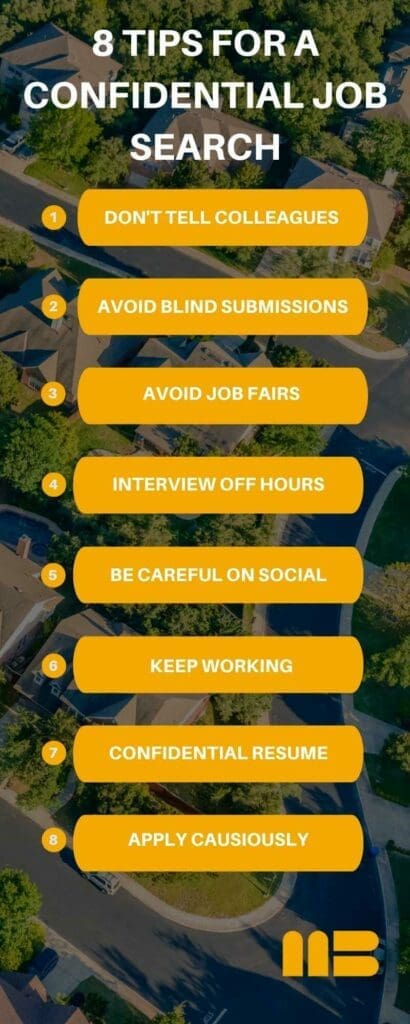Finding a new job can be daunting, especially when trying to keep your search confidential. You may be looking to switch industries, move to a new city, or leave your current job without anyone knowing. Whatever your reasons, conducting a confidential job search while still standing out as an ideal candidate can be tricky.
How do you maintain confidentiality when searching for a job?
- Don’t talk about your job search with colleagues.
- Approve the jobs recruiters are submitting you for.
- Consider confidential versions of your resume.
- Continue working as you normally would.
- Avoid local or industry-specific job fairs.
- Avoid applying to jobs from a confidential employer.
- Don’t utilize company resources for your search.
- Don’t post your resume on job boards or other public websites.
- Only interview during off hours.
- Hide your job search activities on your LinkedIn profile.
Following these tips will help you stay confidential during your job search and increase your chances of success as one of the best candidates.
10 Essential Tips for Conducting a Confidential Job Search
1. Don’t talk about your job search with colleagues.
It is generally in your best interest not to tell your colleagues that you are conducting confidential searches for a new job. For good reason, doing so can create a tense work environment and jeopardize your current job. Discussing your job search with colleagues is also unprofessional and could damage your relationships with them. In most cases, it doesn’t make sense to let your peers at the office know you are considering a change.
2. Approve the jobs recruiters are submitting you for.
Knowing when and to whom you are being submitted for a job is essential. Be sure to ask the executive search firm you work with to inform you before they submit you to a company as a candidate.
Knowing this information is essential because of how small many industries are. For example, you will want to be aware if you are submitted for a job where the employer is best friends with your boss. At MatchBuilt, we do not submit any candidate to a potential builder without their approval and confirmation.
Consider adding a resume confidentiality statement on any resume you send out: “Please protect the confidentiality of this communication. Thank you.”
3. Consider confidential versions of your resume.
You may have heard the advice that you should replace your name with “Confidential Candidate” at the top of your resume. In many cases, this will not work due to the amount of info you have already logged on LinkedIn.
To create a true confidential resume that will be viewed in rare cases, you will need to use a generic email account that doesn’t include your name or any other information that identifies you. Then you will need to remove your contact information except for your generic email address and personal cell phone number on your resume.
You’ll also need to remove the company and university names and dates from the experience and education sections. Finally, you’ll need to remove your name from the file name and the properties box on the final document. That’s a lot of work to hide your qualifications.
In general, using a confidential resume can be a big challenge, and it may be off-putting to a potential recruiter or employer.
4. Continue working as you normally would.
It is essential to continue working as you normally would when trying to stay confidential while searching for a new job to maintain a professional reputation, avoid potential conflicts of interest, and retain your current job security. If you are not discreet about your job search, it could lead to awkward conversations with your current employer, human resources, or colleagues or even jeopardize your current job.
Additionally, if you are open about your job search, it can be seen as a sign of disloyalty, damaging your professional reputation. Staying confidential while searching for a new job can help ensure you find the correct position without any negative repercussions.
5. Avoid local or industry-specific job fairs.
Local or industry-specific job fairs are typically attended by many people from the industry, including current and former colleagues, competitors, and hiring managers. Being seen at these events can draw attention to your job search, potentially jeopardizing your current job and damaging your reputation.
Further, the information you provide at these job fairs may not remain confidential and could be shared with your current employer. To protect your privacy and maintain confidentiality, it is common practice to avoid local or industry-specific job fairs when searching for a new job.
6. Avoid applying to jobs from a confidential employer.
Applying for jobs without a company name on the job posting can be risky because it can compromise your confidentiality. If you submit your resume to a confidential employer, they may be able to trace your identity and contact your current employer. This could lead to your current employer finding out that you are looking for a new job, which could put your current position at risk.
Furthermore, if you are applying for a job at the same company as your current employer, they can see your application and put two and two together. Therefore, avoiding applying to jobs from a confidential employer is vital to maintain confidentiality while searching for a new job.
7. Don’t utilize company resources for your search.
Don’t use your company time, phone, computer, wi-fi, or email address for your job search. Also, don’t store, print, or copy your resume on your work computer. Lastly, don’t use current colleagues or management as references.
Email Address
Do not use your work email address for job hunting. Use your account or set up a free web-based email account specifically for job searching. Remember to check this account frequently because some employers have a tight schedule for interviewing and hiring.
Office Equipment
Don’t use your employer’s computers or phone system. Many employers monitor internet usage and review phone call logs. Keep your resume, email correspondence, and anything and everything related to your job search on your home computer or online. If you have a smartphone or tablet, you can use it for most of your job search activities.
Telephone
Do not use your work phone number for job hunting. Instead, put your cell phone or home phone number on your resume. Be sure to set up voice mail, so you get the messages in a timely fashion.
8. Don’t post your resume on job boards or other public websites.
Posting your resume or a public personal account on job boards or other websites can lead to unwanted attention from employers that you may not be interested in working for or may not be a good fit for your qualifications.
Additionally, if your current employer sees that you are looking for a new job, it could lead to negative consequences such as a decrease in pay or termination. Finally, it can also lead to unwanted contact from recruiters who may not have your best interests in mind.
For example, if you post your resume on Monster, you can make it confidential, and your contact information and references won’t be displayed. You can also block your present company’s name by entering the end date of your present for your current position.
9. Only interview during off hours.
Conducting job interviews during off hours is important to ensure that the conversation remains confidential. If you conduct an interview during work hours, it may be overheard by your colleagues, which could compromise your job search.
By using work resources, such as a work phone or email, to communicate with potential employers, your current employer may be able to access this information, which could also compromise your job search.
By conducting interviews during off hours, you can ensure that the conversation remains confidential and that your job search remains private.
- Ensure all “notify your network” options are checked NO.
- Keep the “let recruiters know you’re open” checked to OFF.
- Don’t publish calls to action on your profile, e.g., “open to new opportunities” or “accepting invitations from recruiters and hiring managers.”
- Avoid posting updates showing intent to change employers.
- Under job-seeking preferences, turn off “signal your interest to recruiters ….”
Conducting a Confidential Search Process Summary
Staying confidential while searching for a new job is essential to ensure that your job search remains private and that your current employer does not find out. To do this, job seekers should avoid using work resources, such as a work phone or email, to communicate with prospective employers.
Instead, prospective candidates should use a personal email address and phone number to communicate with potential employers. Additionally, potential candidates should avoid discussing their job search with their current colleagues, as this could compromise their confidentiality.





